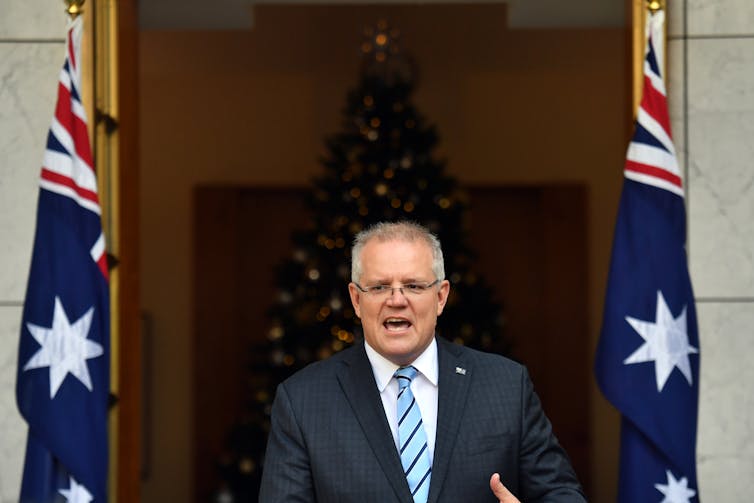Report on public service overhaul a good start, but parliamentary inquiry is needed

The final report of the Independent Review of the Australian Public Service is much more substantial than its interim report. That is hardly a high hurdle, but its 18-page bibliography suggests considerable reflection beyond the (mostly disappointing) submissions and commissioned papers.
However, the report still has an excessive amount of rhetoric and is not an easy read.
Broadly, its themes are:
- a united service
- partnerships beyond the APS
- embracing new technology
- investing in people and capability
- a more dynamic and responsive operational model
- improved leadership and governance.
The central theme of a “united” service is overdone, notwithstanding the case for greater coordination today. The APS does not need “an inspiring purpose and vision” – the first objective set out in the Public Service Act 1999 is clear. It is:
to establish an apolitical public service that is efficient and effective in serving the Government, the Parliament and the Australian public.The APS Values also define the role of the APS as an institution. The review might have made more of the High Court’s references to these in confirming the constitutional standing of the APS.
Read more: View from The Hill: Morrison won't have a bar of public service intrusions on government's power
The review is right to press for a better coordinated service today, retreating from the late 1990s devolution under the new public management model. That Australia went too far is very clear (particularly on pay and conditions). Public expectations in light of modern technology are also demanding much greater connectivity today.
But the review goes too far the other way. The APS performs a wide range of functions, each requiring specialist expertise.
The Secretaries Board is not like a private sector board. Cabinet and ministers are the primary decision-makers under the Constitution, and secretaries’ first responsibilities are within their portfolios, serving and advising their ministers and delivering services and implementing government policies. At the centre it will always be primarily the responsibility of the Australian Public Service Commission (APSC) and the Department of Prime Minister and Cabinet (PM&C) to do the administrative coordination, though necessarily in close consultation with secretaries and other agency heads.
Perhaps the most valuable contribution of the report relates to the application of new technology. It makes a convincing case for very substantial new capital investments over many years and for increasing allocations for minor capital investment. These, and the associated building of skills, are necessary for more citizen-centred services and a more digitally enabled administration.
The report is also on the right track with several other themes:
- invest in people and strengthen capability
- reduce hierarchy and promote more dynamic teamwork across the service
- improve governance and leadership, including by firmer merit-based approaches to appointments.
Why has strategic policy advising capacity declined and other expertise been lost? Why has evaluation activity and skills dropped away? Why has the APS become more risk-averse and hierarchical?
Thankfully, the Thodey Report does include recommendations aimed at strengthening the standing of the APS and clarifying relations with the government and the parliament. These include:
- the accountability and integrity of ministerial staff
- secretary and other agency head appointments and terminations, the respective roles of the APSC and secretary of PM&C, and the appointment of the APS commissioner.
On several other matters there is a disappointing lack of detail, despite the report often pointing in the right direction. These include:
- The discussion of the APS Values ends up proposing some new statement of “principles” to supplement the values. What is needed is to recast the values to reflect more directly the APS’s unique institutional role (and return “merit” to the list).
- The important discussion of place-management fails to set out the architecture required at community and regional levels, and how it might link with state government service delivery.
- The discussion on budgeting rightly highlights the importance of adequate capital investment, but overlooks the equally important issue of how running costs should be financed (without crude efficiency dividends).
The government’s response
Michelle Grattan correctly summarised the response as solidifying the power of the prime minister and rejecting any recommendations that would strengthen the standing and independence of the APS.Sadly, the result will be that many of the recommendations ostensibly “agreed” by the government will not succeed because the drivers behind the reduced capability of the APS (and its risk-averse and hierarchical culture) will remain and will probably grow stronger.
The repeated references in the response to “consistent with the Secretaries Board’s advice” when a recommendation was not agreed is both odd and worrying. If the advice was as claimed, I can only surmise that it demonstrates to the rest of the APS the leadership’s lack of frank and fearless advice. Surely the Secretaries Board supports a more uniform pay and conditions framework, and a more robust process for their own appointments and terminations?
On a positive note, the government agrees with the majority of the recommendations, particularly those relating to digital technology. Most of the responsibility for proceeding will lie with the APS itself. Whether the government will eventually sign up to the capital funding the head of the review, David Thodey, believes will be needed (initially at least A$100 million a year after the audit is complete) is uncertain.
The government has so far agreed only to A$15 million over two years to start work on all the agreed recommendations.
Machinery of government
Aspects of the prime minister’s earlier announcement about machinery-of-government changes have merit. They include:- reducing the separation of policy and administration by replacing DHS with an executive agency within the DSS portfolio
- re-establishing strong links between education, employment and training
- separating energy from the environment, recognising that the tensions between these major functions should be settled in cabinet.
Read more: Morrison cuts a swathe through the public service, with five departmental heads gone
The prime minister’s claim that his restructuring will ensure “congestion busting” and a much improved “line of sight” is contrived and almost certainly illusory. It cannot be achieved without “line of sight” between ministers and the public service. The new infrastructure department will have eight ministers, four in cabinet, several with responsibilities in other portfolios, and around 80 ministerial staff. This is hardly a recipe for a stronger focus on serving the public.
We do not know what, if any, advice the APS provided about these changes. My fear is that APS expertise in such matters has deteriorated greatly in recent years.
Apart from this misalignment between the ministry and the machinery of government, some of the details of these changes are wanting. In particular, there remains a serious problem about the separation of Medicare Australia from health policy.
Where to from here?
The Morrison government’s pronouncements over the past fortnight confirm its lack of real interest in the public service as an institution. Sadly, it seems much of the conservative side of politics has lost the sort of support of our institutions that Menzies and other traditionalists exemplified.Equally, it would be wrong to rely on the other side of politics to pursue the directions in the Thodey Report that the Morrison government has ruled out. Not only would this ignore Labor’s contribution over the years to the current sorry state of affairs, but it would set up for partisan debate the appropriate governance and degree of independence of the APS, something inimical to what fundamentally must be non-partisan.
Instead, we need the parliament to intervene, if not in the immediate light of the Thodey Report and the government’s response, then before or shortly after the next election. A Senate select committee might be asked to undertake an inquiry into the relationship between the APS, the government and the parliament. It should examine:
- the constitutional role of the APS and how this is reflected in the Public Service Act
- the distinctive values of the APS in line with its constitutional role
- the corresponding distinctive values of other components of the Commonwealth, including within the executive, the legislature and the judiciary
- the processes for appointing and terminating secretaries and other APS agency heads
- the respective roles of the APS commissioner and secretary of PM&C
- the roles and responsibilities of secretaries, senior executives and the Secretaries Board
- the Members of Parliament Staffing Act and associated accountability arrangements.
Andrew Podger, Honorary Professor of Public Policy, Australian National University
This article is republished from The Conversation under a Creative Commons license. Read the original article.


